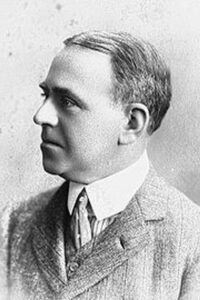
The Hillman
“John Strangewey!” she murmured to herself, glancing across the room at the family tree. “It is curious how that name brings with it a sense of familiarity. It is so unusual, too. And what an unusual-looking person! Do you think, Aline, that you ever saw anyone so superbly handsome?”
The maid’s little grimace was expressive.
“Never, madame,” she replied. “And yet to think of it—a gentleman, a person of intelligence, who lives here always, outside the world, with just a terrible old manservant, the only domestic in the house! Nearly all the cooking is done at the bailiff’s, a quarter of a mile away.”
Louise nodded thoughtfully.
“It is very strange,” she admitted. “I should like to understand it. Perhaps,” she added, half to herself, “someday I shall.”
She passed across the room, and on her way paused before an old cheval glass, before which were suspended two silver candlesticks containing lighted wax candles. She looked steadfastly at her reflection. A little smile parted her lips. In the bedroom of this quaint farmhouse, she was looking upon a face and a figure that the illustrated papers and the enterprise of the modern photographer had combined to make familiar to the world.
A curious feeling came to her that she was looking at the face of a stranger. She gazed earnestly into the mirror, with new eyes and a new curiosity. She contemplated critically the lines of her slender figure in its neat, perfectly tailored skirt—the figure of a girl, it seemed, notwithstanding her twenty-seven years. Her soft, white blouse was open at the neck, displaying a beautifully rounded throat. Her eyes traveled upward, and dwelt with an almost passionate interest upon the oval face, a little paler at that moment than usual; with its earnest, brown eyes, its faint, silky eyebrows, its strong, yet mobile features; its lips a little full, perhaps, but soft and sensitive; at the masses of brown hair drawn low over her ears.
This was herself, then. Did she justify her reputation for beauty, or was she just a cult, the passing craze of a world a little weary of the ordinary standards? Or, again, was it only her art that had focused the admiration of the world upon her?
How would she seem to these two men downstairs, she asked herself—the dour, grim master of the house, and her more youthful rescuer, whose coming had somehow touched her fancy? They saw so little of her sex. They seemed, in a sense, to be in league against it. Would they find out that they were entertaining an angel unawares?
She thought with a gratified smile of her incognito. It was a real trial of her strength, this! When she turned away from the mirror the smile still lingered upon her lips, a soft light of anticipation was shining in her eyes.
John met her at the foot of the stairs. She noticed with some surprise that he was wearing the dinner jacket and black tie of civilization.
“Will you come this way, please?” he begged. “Supper is quite ready.”
He held open the door of one of the rooms on the other side of the hall, and she passed into a low dining room, dimly lit with shaded lamps. The elder brother rose from his chair as they entered, although his salutation was even grimmer than his first welcome. He was wearing a dress coat of old-fashioned cut and a black stock, and he remained standing, without any smile or word of greeting, until she had taken her seat. Behind his chair stood a very ancient manservant in a gray pepper-and-salt suit, with a white tie, whose expression, at the entrance of this unexpected guest, seemed curiously to reflect the inhospitable instincts of his master.
Although conscious of this atmosphere of antagonism, Louise looked around her with frank admiration as she took her place in the high-backed chair that John was holding for her. The correctness of the setting appealed strongly to her artistic perceptions. The figures and features of the two men—Stephen, tall, severe, stately; John, amazingly handsome, but of the same type; the black-raftered ceiling; the Jacobean sideboard; the huge easy chairs; the fine prints upon the walls; the pine log which burned upon the open hearth—nowhere did there seem to be a single alien or modern note.
The table was laid with all manner of cold dishes, supplemented by others upon the sideboard. There were pots of jam and honey, a silver teapot and silver spoons and forks of quaint design, strangely cut glass, and a great Dresden bowl filled with
Read or download Book
E. Phillips Oppenheim
Edward Phillips Oppenheim (22 October 1866 – 3 February 1946) was an English novelist, and a prolific writer of best-selling genre fiction, featuring glamorous characters, international intrigue, and fast action. Notably easy to read, they were viewed as popular entertainment. He was featured on the cover of Time magazine in 1927.
Biography
Edward Phillips Oppenheim was born on 22 October 1866 in Tottenham, London, the son of Henrietta Susannah Temperley Budd and Edward John Oppenheim, a leather merchant. After attending Wyggeston Grammar School until the sixth form in 1883, his family’s finances forced him to withdraw and he worked in his father’s business for almost twenty years. His father subsidized the publication of his first novel, which proved just successful enough to break even. He published five of his novels between 1908 and 1912 under the pseudonym “Anthony Partridge”.
Around 1900, Julien Stevens Ulman (1865–1920), a wealthy New York leather merchant who enjoyed Oppenheim’s books, bought the leather works and made him a salaried director to support his writing career.
He quickly found a successful formula and established his reputation. In 1913, John Buchan, launching his career as a suspense novelist, called Oppenheim “my master in fiction” and “the greatest Jewish writer since Isaiah”. As early as that year, his publishers were bringing out new editions of some of his earlier works to meet, in the words of one trade publication, “the insatiable demand of the public for more stories by him”. It added: “Readers of the author’s recent books will find these first stories of life sketches full of interest, their very crudeness being positively amusing in light of his present finished craftsmanship.”
In 1892 Oppenheim married an American, Elise Clara Hopkins of Easthampton, Massachusetts. They lived in Evington, Leicestershire in what is now The Cedars pub until the First World War and had one daughter. During that war, he worked for the Ministry of Information.
He described his method in 1922: “I create one more or less interesting personality, try to think of some dramatic situation in which he or she might be placed, and use that as the opening of a nebulous chain of events.” He never used an outline: “My characters would resent it.” When he needed villains for his diplomatic and political intrigues he drew on Prussian militarists and anarchists, enough for one reviewer to lament “the baldness of his propaganda”. For example, in A People’s Man (1915), a socialist discovers that his movement is secretly run by German spies.
A 1927 review in The New York Times said he “numbers his admirers in the hundreds of thousands and has one or more of his books on a prominent shelf in almost every home one enters”. He appeared on the cover of Time magazine on 12 September of that same year.
Reviews for his work treated them as entertainment with only a slight relationship to the mystery genre. In 1933, a review of Crooks in the Sunshine explained that “Mr. Oppenheim’s crooks are so polished that they have no difficulty in moving in the very best society…. There is very little mystery in this book, but there is dress-suit crime galore.” In 1936, a review of A Magnificent Hoax, his one-hundredth novel, said: “The hoax is on the reader, who is led, through nearly 300 pages, only to find that nothing very terrible has happened. The explanation takes a bit of believing, but since it extricates several very nice people from what looks like a nasty mess, one is willing to let that pass.” The Shy Plutocrat, published early in World War II, was “a good tale to take your mind off your worries”. Readers came to expect familiar themes, “the peculiar Oppenheim blend of dispatch-box atmosphere, femmes fatales, double traitors, and a tight plot”. In mid-career, The Great Impersonation (1920) was called “his best work”.
Along with dozens of novel and short story collections, he produced an autobiography, The Pool of Memory, in 1942.
Oppenheim’s literary success enabled him to buy a villa on the French Riviera and a yacht, then a house in Guernsey, though he lost access to this during the Second World War. He regained the house, Le Vauquiedor Manor in St. Martins, after the war and died there on 3 February 1946. His wife died there on 25 November.
An assessment that appeared in The New York Times upon his death said: “As he recalls in his pleasant and modest autobiography, all his books were easy to write. They were equally easy to read, especially on a summer vacation when escapist literature is most welcome.” He composed by dictating to a secretary and once produced seven works in a single year. His social set included the characters that populated his novels, where he created “a glamorous world of international intrigue, romance, and plushy society galloping along in swift action and suspense”. One academic study calls him “a talented entertainer”.






